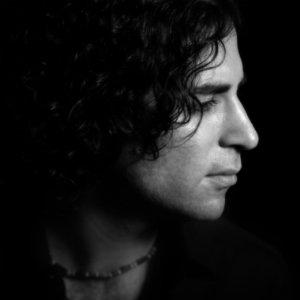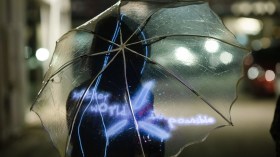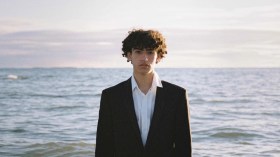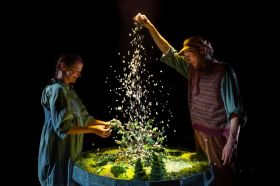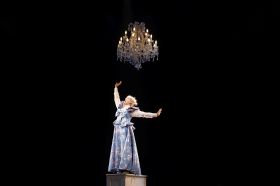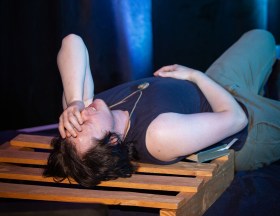The venue was the Great Hall of Sydney University, a sandstone block affair that, at the last concert – a performance of Bach’s St John Passion, and a glorious one at that – was rather humid and rather hot. This time it was not a little bit frigid. Scattered around the room were eight or so portable heaters, all of them pumping warm air into the cold space, though, at least to my knowledge, they were turned off once the concert started, such that what started out at a bearable temperature eventually dropped to a less than pleasant – though far from frostbite inducing – chill. The academics of ages past, captured in the stained glass windows that ran along the top of the walls, all looked much more comfortable than some of the patrons. As for the other changes: the entry, before from two doors, now was from an entirely different third; while the seats, facing away from the organ for the Bach, were now facing resolutely towards it. The only thing that hadn’t changed, it seemed, was the quality, and what quality it was – this was a fantastic concert.
After a brief introduction and plea for donations from artistic director Paul Stanhope – including a joke that this critic would love to repeat to add a bit of colour, but unfortunately didn’t actually hear – we began with Durufle’s Quatre motets sur des themes gregoriens (Four Motets on Gregorian Themes), Op. 10. It was a series of short and sweet motets that were, thankfully, long enough to have some proper substance, unlike many a suite that can suffer from too much brevity in each of its movements, such that one merely recognises the effect, rather than truly feeling it. The choir was clearly in full flight from the off.
Next came Messiaen’s O sacrum convivium!, which was exquisite in its slowness – the program tells us that ‘a mere 35 bars of music takes around five minutes to sing’. Conductor Thomas Wilson, born in New Zealand, and, among many other achievements, a former assistant organist and later Precentor to Westminster Cathedral, achieved a fine tone and balance that all the great choirs have.
Peter Sculthorpe’s Requiem: for cello alone came next, with cellist Julian Smiles taking to the stage to play a selection of three movements from it (two now, and one later on), which, while superbly played, were nevertheless unremarkable when compared to the music that had come before. Ligeti’s Lux aeterna followed, with the choir, having retreated to the back of the hall to give Smiles some room, now also singing from the back, the audience left to look at nothing but the organ. The effect was to ‘float’ the music, as it shifted in and out of existence. It was an eerie, tense experience, and rather rewarding, though feeling slightly like one was being initiated into a cult. (Not that this was something to count against the piece – there’s too little coercion in most concerts, I find.)
Sculthorpe’s Lullaby (Canticle) returned the choir and cellist back to the proper platform, and, with its use of Torres Strait Islander language, provided a resolutely Australian outlook, complete with bird cries from the cello and heart-warming harmonies (much needed with the temperature dropping) from the vocalists.
A world premiere ended the first half, namely Michael Yezerski’s Kaddish Avelim, a piece following a Hebrew text that was one of the highlights of the concert. Not only was the sound different from the usual Latin, as one can imagine, but the breaking through of chanting soloists against the backdrop of the rest of the ‘congregation’ was something that this critic found both effective and strikingly moving. It was very well received by the audience, and rightly so.
After the interval came Durufle’s Requiem, Op.9, Amy Johansen accompanying with the organ, while Julian Smiles helped out with the cello for the Pie Jesu, ably sung by Belinda Montgomery, even though the piece had been orchestrated for organ alone. (There had been three versions, one with a full orchestra, one with a reduced orchestra, and the one we heard that afternoon.) All three musicians performed from the first floor, next to the organist, and what could well have been disjointed – what with the cello being in a place where a cello was not meant to be – turned out to be one of the best movements of the work. The other peak was the Kyrie Eleison, which nearly brought tears to this critic’s eyes as it was so utterly, sublimely beautiful.
A wonderful, if somewhat chilly, concert.
Rating: 4 ½ stars out of 5
Lux Aeterna
Sydney Chamber Choir
Thomas Wilson (guest conductor), Julian Smiles (cello), Amy Johansen (organ)
Maurice Durufle – Quatre motets sur des themes gregoriens (Four Motets on Gregorian Themes), Op. 10
Olivier Messiaen – O sacrum convivium!
Peter Sculthorpe – Requiem: for cello alone [selections]
Gyorgy Ligeti – Lux aeterna
Peter Sculthorpe – Lullaby (Canticle)
Michael Yezerski – Kaddish Avelim (World Premiere)
Maurice Durufle – Requiem, Op.9
Great Hall, University of Sydney
June 24

